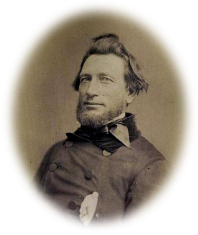19th.–Moved at 7 this morning. Marched to-day over much of the same ground which we travelled over on our way to Richmond. But strange! There was scarcely a spot which I could recognize. Heretofore my memory of places has been almost wonderful. Why could I not now recognize? Has age impaired my memory, or was my mind at the time of passing so occupied with weightier matters that ordinary scenes and circumstances made no impression!
At 12 M. to-day we reached Yorktown. How wonderfully our minds deceive us in estimates of places and things associated with great events! Whoever heard of Yorktown, that city on the banks of the noble York River, on the sacred soil of the great State of Virginia? The famous city where Lord Cornwallis took his stand to crush out the American rebellion–the city in which was fought the last great battle for American independence–the mother of a nation, and which lives to have witnessed the growth of that nation through youth to maturity, from the feeble efforts of infancy to the power of a giant, and still lives to look on her offspring: sent by the convulsive struggles of its own strength, perhaps to final dissolution. I ask what mind can contemplate a city associated with all these events and recollections, without being possessed of ideas of its vastness and its splendor? But what the reality? Yorktown is a little dilapidated old village, which never contained a population of over 200 or 300, and at the commencement of this war not over 150. When I look on its insignificance, or rather on its significant littleness, I find it difficult not to detract from the ideas of greatness, associated with the great men who figured there. How wonderfully have the great advantages which nature has lavished on this State been prostituted to the one great idea of maintaining her peculiar institution, which she has nursed and defended against the approaches of the world, as she would protect and encourage the whims and weakness of a sickly girl.[1]
A circumstance occurred to-day so painful that I should like to forget it, yet so suggestive of the trials of this army and of the discouragements which has occasioned much of their indifference to events, that I feel it a duty to record it, that it may not be forgotten. On the late retreat from Richmond, most of the men found it necessary to throw away everything which impeded their progress, even their canteens. During our stay at Harrison’s Point they had not been fully replaced. This morning we started early. The day has been intensely hot, the dust almost insufferable. Gen. H–– was in command of his brigade. We had made a rapid march of about ten miles. The men were fatigued, foot-sore and thirsty. In many instances, two or three having to depend on one canteen, it was soon emptied, and when we stopped to rest after the ten mile march, we were in sight of a large spring of beautiful cold water. But the General ordered that not a man should leave the ranks to fill his canteen. It was hard to bear, but the men submitted in patience till they saw the soldiers from other brigades passing from the spring with their canteens filled. This was too much, and they commenced crying out “Water, water.” Immediately the General dashed amongst them, proclaiming “mutiny,” and demanding the offenders. Of course no one could tell who they were. He then turned upon the Regimental and Company officers, “damned them to hell,” and spent some time in consigning the soldiers to the same comfortable quarters. After he had got them all labeled for that kingdom, he told them that their officers were “not worth a G–d d–n,” and having exhausted his vocabulary of gentlemanly expletives, calculated to encourage subordination, he called the men into line and put them through the evolutions of a brigade drill for about half an hour, and thus were they rested to resume the march. These men–this remnant of a fine army, who had been dragged through the putrid swamps of the Chickahominy till they were more like ghosts than men, were thus rested, thus drilled, thus marched, thus abused. Surely the end is not yet.
[1] I think that all the towns on this noble river, from its source to its mouth, will not amount in the aggregate to a population of 2,000 souls! And the same may be said of the James River, from Richmond to its outlet; and yet these rivers pass through one of the finest agricultural regions in the world. There is not a spot of earth, the wheat from which can compete in market with that of the James River.
